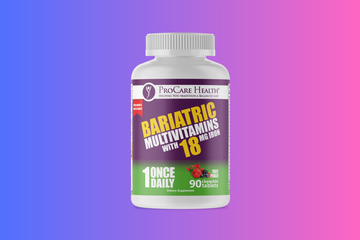by Anthony Benjamin on Oct 12, 2022

What to Expect During Your Hospital Stay
It is normal to be nervous anytime you are headed to the hospital and about to undergo a surgical procedure. Set your mind at ease. You have selected a team of doctors and a hospital that is ready to care for you.
Depending upon which weight-loss procedure you are having, the length of hospital stay may range from less than one day (outpatient) to four days. Your visit to the hospital can be divided into five different stages: preoperative, surgery, postoperative, recovery, and discharge.
No matter your length of stay, patients have some common questions about what to expect before and after surgery.
Preoperative Preparation
A few days before surgery, go grocery shopping for your after surgery liquid and pureed food diets. Planning and prepping for meals before surgery will help you stick to your new eating schedule after you come home.
Preparation for surgery often begins two weeks in advance with laboratory work, EKG (electrocardiogram), and chest x-rays. You will also be instructed not to take aspirin, aspirin products, or any type of blood thinner for seven days before surgery. To help reduce the risk of infection, your doctor may require you to wash with an antibacterial soap starting four days before your procedure. Then, you will not be able to eat or drink for 12 to 24 hours before surgery.
Most hospitals require that you arrive a minimum of two hours before your procedure. The preoperative period covers the first two to four hours at the hospital. After checking in, your team of nurses will prepare you for the operating room, check your vital signs, and start an IV. Also, you’ll meet with the anesthesiologist and your surgeon. They will ask you questions and will tell you what to expect in the operating room. Depending on your surgeon’s preference, an epidural catheter may be placed for pain management.
Surgery
After entering the operating room, you will be transferred to the operating table. You may notice technicians completing equipment setup and nurses getting supplies ready. You will be hooked to monitors, and you will have blankets to keep you warm.
Your anesthesiologist will sedate you for the procedure. Depending on the type of weight-loss procedure, the surgery can last one to four hours. Your surgical team will update your family and friends in the waiting room.
Immediate Postoperative
You will spend the first two to three hours after your surgery in the recovery room, where nurses will monitor your vital signs and pain. Most likely, you will be groggy as your body rids itself of the anesthesia.
If you are staying in the hospital overnight or for a few days, you will be transferred to a hospital room after your time in the surgical recovery room is finished.

Hospital Recovery
Depending upon the type of weight-loss procedure you had, the hospital stay for most bariatric patients ranges from one to three days.
You may experience pain at the incision site as well as sore muscles. Be sure to take the prescribed medication to help manage the pain. It’s best to ask for medicine before the pain escalates.
Your surgeon will also continue IV fluids and will have you on antibiotics to prevent infection. You may also have a nose cannula for oxygen, a urinary catheter, and an abdominal binder. To prevent blood clots, your surgeon may prescribe compression stockings for your legs.
During the first 24 hours, your surgeon will likely not allow you to eat or drink anything. Before taking in any fluids by mouth, your doctor will perform a leak test to ensure that your digestive system is operating correctly. This test occurs the day after surgery typically, and once you pass this test, you will be allowed to drink. After you start sipping water, your IV will be removed.
Even though you may find drinking water to be uncomfortable, continue to drink slowly to prevent dehydration, which can occur quickly. Water also helps your body recover by transporting nutrients necessary for healing to your cells and ridding your body of waste and toxins.
Usually, within eight to ten hours after surgery, you will be encouraged to get up and walk. Getting out of bed and moving is vital for preventing blood clots. It also helps you deep breathe (important for preventing pneumonia) and gets your intestines working again. The nurses will help you with other exercises to help prevent complications.
If you have any questions during your stay, ask your nurses and surgeon. They will help put your mind at ease.

Discharge Home
Congratulations on making it through the surgery with ease. You are officially on your way to a healthier you! You may still feel some pain, but this will gradually go away. You can expect to feel better each day.
When the time comes to leave the hospital, be prepared to have someone drive you home. On the way home, stop to pick up pain medication. If your ride home is longer than two hours, plan to stop so you can get out of the car and stretch.
Once you are back home, it is important to remember not to overdo anything because your body needs time to heal. The following are some tips for your first few days at home:
- Don’t drive while on pain medication
- Keep a pillow nearby and hold it against your stomach when you cough or sneeze to reduce pain these activities can cause
- Avoid sleeping on your stomach and try to sleep on your back or sitting up for the first one to two weeks
- Keep your incision site as well as your drain site and tubing clean
- Get up and walk around frequently to keep your lungs healthy and to help your body rid itself of excess gas from surgery, which can cause pain
If you work, most people can return to their jobs in as early as three days with others going back to work in up to three weeks. Be sure to follow activity and dietary guidelines as well as all other postoperative instructions from your doctor.
ProCare Health is Committed to Your Recovery from Bariatric Surgery
At ProCare Health, we have the vitamins and supplements essential to helping you heal as you embark on your weight-loss journey. Our once-daily vitamin is specially designed for people who have undergone bariatric surgery. Our multivitamin uses easy to absorb ingredients, so you can be confident you are getting the absorption and essential nutrients. Please contact us today with questions, to get a free sample, or to place an order.


ProCare Health's Dye-Free Products

How ProCare Health Innovated Bariatric Vitamins

